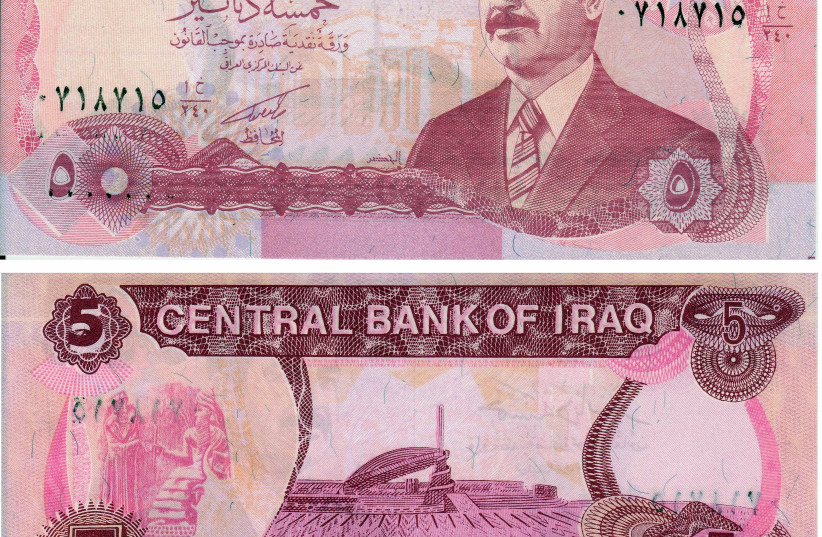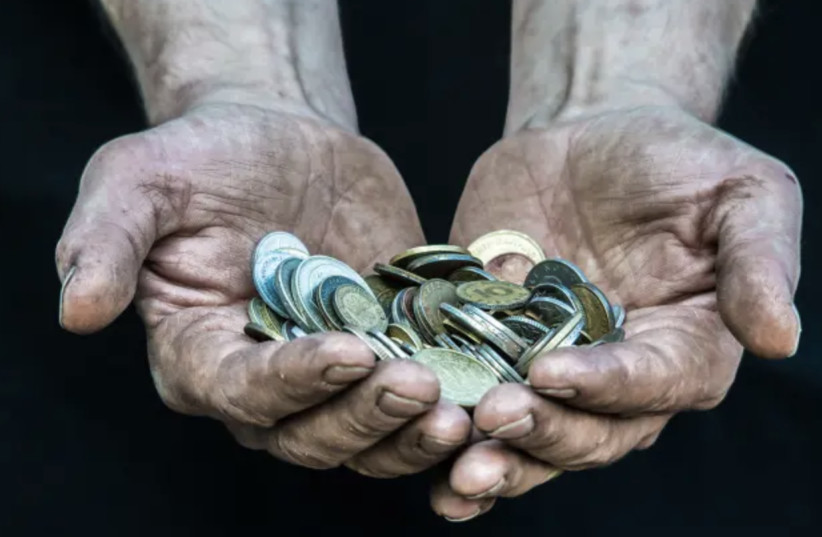Measures introduced earlier this year by the US Federal Reserve and the Central Bank of Iraq have reduced the smuggling of currency, mostly dollars, out of Iraq but have not yet brought the problem to an end.
For more stories from The Media Line go to themedialine.org
According to Ahmed Ali, an employee at the Central Bank of Iraq’s Banking Control Department, the smuggling of currency abroad has decreased by more than 95%.
In order to address the problem of smuggling, Iraq’s government revalued the price of the Iraqi dinar to 1,310 dinars to the dollar from the previous price of 1,460 dinars to the dollar, which enhances the value of the local currency against the dollar. The government mandated that banks, money changers and real estate agents all use these rates.
Iraq's access to its own US dollars
The Iraqi government decision came in response to a US Federal Reserve policy that restricts Iraq’s access to its own dollars – housed with all of Baghdad’s foreign currency reserves at the US Federal Reserve, which is meant to prevent the flow of money from Iraq into Iran and Russia by limiting the flow of dollars into Iraq. The Federal Reserve also insisted that the Central Bank of Iraq implement measures to prevent smuggling, such as recording dollar transfers on an electronic platform and requiring proof of legitimate travel abroad for those seeking to take out foreign currency.

The Iraqi government’s measures have slightly reduced the difference between the official exchange rate and the black-market exchange rate. On the black market, a dollar currently can be purchased for between 1,520 dinars and 1,580 dinars, compared to the 1,750 dinars at which a dollar had previously been valued on the black market.
Mohammad Tawfiq, who owns a currency exchange business, told The Media Line that the rate of currency smuggling has been significantly reduced.
“Before, $20 million to $40 million was smuggled daily, but now the currency smuggled into Iran is less than $100,000 daily,” Tawfiq said.
Those seeking to smuggle money have found workarounds to the government’s policies, though.
Proof of travel abroad
In response to the new requirement that Iraqis present proof of travel abroad in order to take out foreign money, a black market for passports has cropped up, Tawfiq explained.
“This trade has appeared, where they obtain a person’s passport, and give him $300 to $400 in exchange for issuing a ticket reservation in his name, which is usually a forged ticket, in addition to a forged hotel reservation from the reservation sites, and they get the sums that are either smuggled or sell them on the parallel market,” Tawfiq said.
According to Ahmed al-Missouri, a branch manager at a Western Union in Iraq, the measures meant to prevent currency smuggling have made obtaining legitimate foreign transfers much more tedious.
“The official exchange rate has been approved at our exchange, but the waiting queues are endless,” al-Missouri said.
As part of Iraq’s attempt to comply with the US Federal Reserve’s demands, it closed down several banks that were not adhering to the anti-smuggling procedures. The institutions that do follow the proper procedures have found themselves overwhelmed.
“The Western Union system is the most accurate, as we know exactly to whom the money was transferred in the other country, and this is done in accordance with the official laws and regulations, and this facilitates the task of dealing with official procedures,” al-Missouri said.
“Every day we receive customers that exceed our work capacity. The queues do not end, and every day there are many who stand in line and we cannot transfer money to them before the end of our official working hours, even overtime hours,” he continued. “Most of those who transfer money to us are people from abroad, either to buy goods from foreign countries, or to transfer retirement salaries that they receive on behalf of those abroad, or even transfer amounts from the sale of real estate or other things. We do not deal with any political matters.”
Even as the Iraqi government has shut down banks that were not compliant with the anti-smuggling measures, new unscrupulous institutions have cropped up, namely those that engage in currency manipulation.

An Iraqi security source told The Media Line that some institutions in Baghdad have been hoarding millions of dollars in order to artificially increase the exchange rate.
“A hotline has been opened to report any violator or manipulator of the stock exchange, and more manipulators of dollar exchange rates will be arrested,” the source said.
Economic volatility has been waning
The initial economic volatility caused by the Federal Reserve intervention has mostly waned. The prices of imported goods, though, remain much higher than they had been.
“Prices have decreased significantly, but the market is still tense, and there is no buying and selling as it was before,” Iraqi business journalist Razzaq Hussein told The Media Line.
He noted that Iraq is due to approve a budget in the coming weeks, which may improve the economic situation.
Hussein explained that Iraq also is attempting to develop its electricity sector in order to reduce its reliance on Iranian gas.
“We also hope that the implementation of the electricity purchase agreements from Jordan, Egypt and the Gulf states will solve the crisis between Iraq and Iran over dollar payments,” Hussein said.
